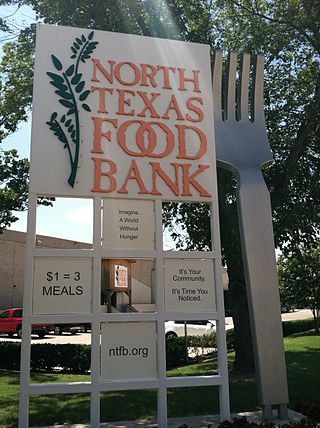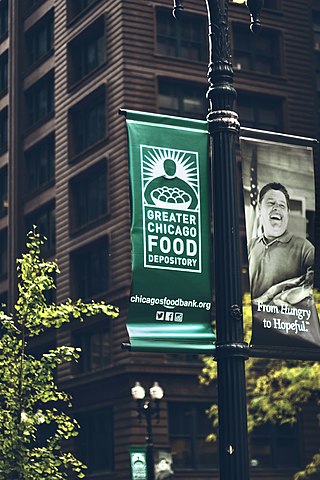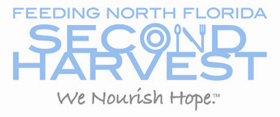A click-to-donate site is a website where users can click a button to generate a donation for a charity without spending any of their own money. The money for the donation comes from advertisers whose banners are displayed each time a user clicks the button. While not directly contributing, visitors are making a difference in the sense that, had they not visited, no donation would have been given.

The Restaurants du Cœur, commonly known as the Restos du Cœur, is a French charity, the main activity of which is to distribute food packages and hot meals to those in need. The association targets homeless and those with a low or a very low income. The association also helps people to find housing and supports other projects. This not-for-profit association has the "reconnu d'utilité publique" status which exempts it from specific taxes. The association, highly respected in France, is known for its huge number of volunteers and its original fund-raising method.
Food City is an American supermarket chain with stores located in Alabama, Georgia, Kentucky, Tennessee, and Virginia. It is owned by K-VA-T Food Stores, Inc., a privately held family and employee-owned corporation headquartered in Abingdon, Virginia. K-VA-T Food Stores owns the Food City Distribution Center, a distribution center K-VA-T helped form in 1974 and acquired full control of in 1998, Misty Mountain Spring Water, LLC, a producer of bottled water, as well as limited-assortment grocery stores named Super Dollar Food Center, Food City Express and Gas'N Go convenience stores, and Food City Wine and Spirits liquor stores. Many of their grocery stores have their own fuel stations, with the Gas'N Go branding.

The North Texas Food Bank (NTFB) is a social benefit organization located in Plano, Texas. The organization distributes donated, purchased and prepared foods through a network of nearly 1,000 feeding programs and 400 Partner Agencies in 13 North Texas counties. The NTFB supports the nutritional needs of children, seniors, and families through education, advocacy and strategic partnerships.

Food for Life Global is a non-profit vegan food relief organization founded in 1995 to serve as the headquarters for Food for Life projects. Food for Life Global has its roots in ISKCON dating back to 1974. It is a completely independent non-profit organization that supports the work of Food for Life projects both inside and outside of ISKCON. Its network of 291 affiliates span the globe, with projects occupying over 65 countries. Volunteers provide over 1 million free meals daily. Food For Life engages in various sorts of hunger relief, including outreach to the homeless, provision for disadvantaged children throughout India, and provision for victims of natural disasters around the world.
Sedano's Supermarkets is the nation's largest Hispanic retailer and largest Hispanic-owned supermarket chain. With headquarters in Miami-Dade County. Sedano's employs approximately 3,000 associates and operates 35 stores across Florida in Miami-Dade, Broward, Orange, and Osceola counties. Sedano's is also the largest member of Associated Grocers of Florida, a wholesale grocery food cooperative. In 2020, Sedano's Supermarkets was named Food and Wine’s 20 Best Regional Supermarket Chains of All Time.

Project Angel Food is a 501(c)(3) nonprofit organization in Los Angeles County which provides free meals for people too sick to shop and cook for themselves. Project Angel Food serves the majority of Los Angeles County; South Los Angeles and Metro Los Angeles are the two largest service areas for the organization. As of 2017, their clientele is 39% Hispanic and Latino, 29% African-American, 21% non-Hispanic White, and 11% from other races.

Food rescue, also called food recovery, food salvage or surplus food redistribution, is the practice of gleaning edible food that would otherwise go to waste from places such as farms, produce markets, grocery stores, restaurants, or dining facilities and distributing it to local emergency food programs.
New Eyes for the Needy is a non-profit organization started in 1932 as New Eyes and based in Short Hills, New Jersey, which provides people in the United States with eyeglasses and sends recycled eyeglasses to needy people overseas.
Gleaners, Inc., also known as The Volunteers Of Gleaners, is a Jackson, Mississippi-based non-profit organization founded by Gloria Martinson in 1986. It salvages food that otherwise would go to waste and redistributes it to other non-profit shelters in the metro area. Claude Mapp is the current CEO and Nancy Willis is the Director of Operations.

The Greater Chicago Food Depository (GCFD) is a nonprofit organization that fights hunger throughout Cook County, Illinois. The GCFD distributes donated and purchased food through a network of 700 food pantries, soup kitchens, shelters and community programs, serving more than 800,000 adults and children every year. In fiscal year 2016, the GCFD distributed more than 70 million pounds of nonperishable food, produce, dairy products, and meat - the equivalent of more than 160,000 meals every day. Of the $96,883,955 spent in 2016, over 90% went to direct food distribution programs.
The Temporary Emergency Food Assistance Program (TEFAP) is a program that evolved out of surplus commodity donation efforts begun by the USDA in late 1981 to dispose of surplus foods held by the Commodity Credit Corporation (CCC). This program was explicitly authorized by the Congress in 1983 when funding was provided to assist states with the costs involved in storing and distributing the commodities. The program originally was entitled the Temporary Emergency Food Assistance Program when authorized under the Temporary Emergency Food Assistance Act of 1983. The program is now known as The Emergency Food Assistance Program (TEFAP).

Leket Israel, The National Food Bank, a registered nonprofit Israel-based charity, is the leading food rescue organization in Israel, serving 175,000+ needy people weekly. Leket Israel rescues surplus agricultural produce and collects excess cooked meals for redistribution to the needy throughout Israel via its network of 200+ nonprofit organization (NPO) partners.
Yad Eliezer is a Jewish poverty-relief organization in Israel. It is best known for its monthly distribution of thousands of family food packages, baby formula and baby food packages. It also provides a range of financial and rehabilitative support services, including the mentoring of boys from single-parent families and free or low-cost weddings at its wedding complex in Givat Shaul, Jerusalem. Founded as a small, neighborhood chesed organization, it is now one of the largest poverty-relief organizations in Israel, with over 12,000 volunteers. Led by Orthodox Jewish management, it provides services for both religious and secular families in Israel.

Second Harvest North Florida (SHNF) is a 501(c)(3) non-profit organization located in Jacksonville, Florida, that performs food rescue and redistribution to partner agencies in one quarter of Florida's 67 counties. The charitable organization has been active for over 30 years.
Food Angel is a Hong Kong–based food rescue organization. Food Angel was launched in 2011 by the Bo Charity Foundation. The organization is supported by local and international food donors, sponsors, and charity partners.
Northern Illinois Food Bank is a 501(c)(3) non-profit organization that focuses on providing food to those in need in northern Illinois. Partnerships and donors allow for more than 71,000 people to be fed each week through different programs. Northern Illinois Food Bank operates in 13 counties surrounding Chicago. The organization has four distribution centers located in Geneva, Rockford, Park City, and Joliet, which distribute food to pantries who then allocate the food to people.

La Soupe is a Cincinnati, Ohio, nonprofit organization that uses discarded food to produce meals and delivers them to other nonprofit agencies for distribution to people experiencing food insecurity.

St. Mary's Food Bank Alliance is a nonprofit, nonsectarian organization located in Phoenix, Arizona. Founded in 1967 by John van Hengel, St. Mary's was the first modern organization to operate using the food bank model, which spread throughout U.S. and the rest of the world. Today, St. Mary's is recognized as the world's first food bank.

Rethink Food NYC Inc, commonly called Rethink Food or just Rethink, is a non-profit organization based in New York City. The organization was founded to address hunger in the United States by contributing to a sustainable and equitable food system. Rethink collects excess food from restaurants, grocery stores, and corporate kitchens to provide nutritious meals for people living without food security at low or no-cost. The organization expanded its operations in March 2020 to meet growing food demands amid the COVID-19 pandemic in the United States.










